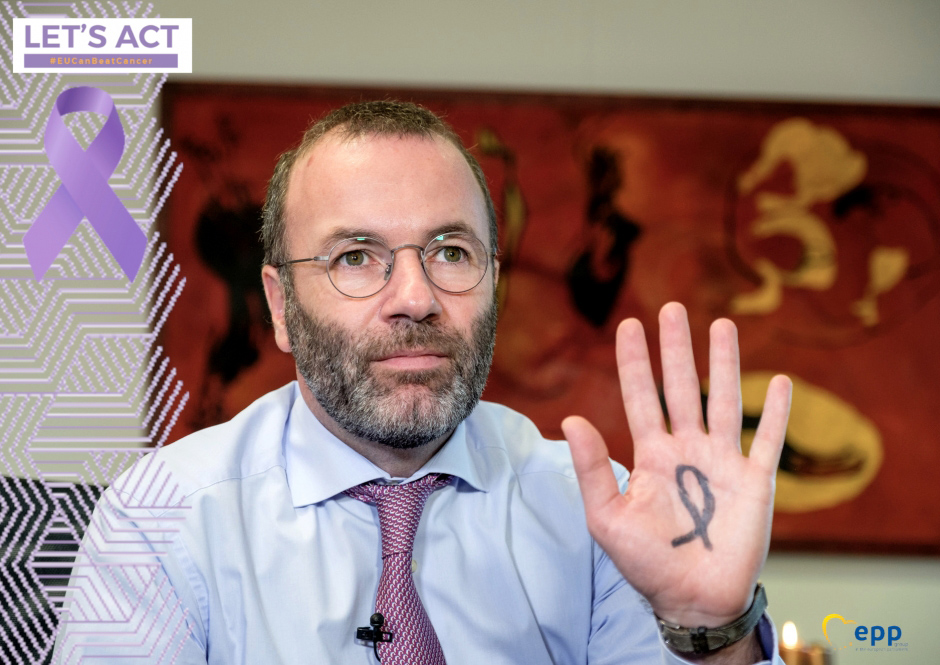4th February 2020
This World Cancer Day, we speak to Member of the European Parliament (MEP) Manfred Weber about his plan to fight cancer and how organisations such as EIT Health can help.
Manfred Weber is the leader of Germany’s European People’s Party (EPP) and a Member of the European Parliament.
Why should the fight against cancer be a priority today?
We work on behalf of all Europeans and we have one clear mission: to make people’s lives better. We should deliver on what really matters and where Europe is capable of making a difference. Cancer is an emotive subject for all of us, and it is striking to know that, some way or another, 40% of us will face cancer in our lives.1

Each day in the EU, 56 times more people die of cancer than in car accidents.2,3 Cancer is becoming the leading cause of death in many EU Member States. This is something that European policy-makers must act upon, and we are on the right path to making a difference.
As a result, we have established a Special Committee on Cancer in the European Parliament to bring forth a European master plan to fight cancer. Having the new legislative term ahead of us, with a European Commission that has fully taken this fight on board, we start from a solid standpoint to pursue our ambitious goals. I feel that this is an initiative that can make Europeans proud to belong to our Union.
How can Europe make a difference?
Beating cancer is not something that any single country can imagine achieving alone. Whether France, Italy or Germany, none of us can possibly face such a huge challenge in isolation. Although health policy remains primarily in the hands of Member States, European joint action can truly have an impact. To achieve great innovation and breakthrough advancements, it is essential to combine all our research capacities and our resources, to pool our knowledge and our data. We must bring all our professionals together and give them greater power to drive innovation, and this includes increasing the research budget of Horizon Europe to support the fight against cancer.
Joint action is even more necessary when it comes to remedying the disparities across Europe. It should not be the case that patients in different parts of the region have differing experiences of cancer care. We must ensure the same quality of care across Europe because nobody should ever be left behind.
What do you propose as the main steps of the master plan?
Thanks to the advice of many of leading European experts, we laid down a plan to set the main priorities and a vision for possible goals to achieve.
Prevention is the first essential element, as doctors clearly tell us that many cancers are preventable. For this, we need a concerted European prevention strategy. The same goes for early detection efforts, to be able to act before the disease has progressed.
Secondly, we believe innovation plays a key role and we must make the best of our technological capacities. For instance, Big Data can fuel revolutionary discoveries, and that is why a European Digital Cancer Centre that allows our experts to access vast amounts of data and see the bigger picture behind single dots would be beneficial. Indeed, in Europe we strike a balance between progress and protection; we want to ensure patient data is protected at all times and that they remain the owners of their information, without preventing our researchers from innovating.
Telemedicine and eHealth platforms should also be explored to break down barriers to consistent cancer care for people across regions, particularly those who may live in remote areas without access to specialist hospitals or other relevant healthcare services.
Last, but by no means least, we must support both patients and caregivers during such a difficult time in their lives. We also believe it is crucial to encourage Members States to adopt stronger legislation to safeguard the right not to be forgotten. We cannot accept that patients who have recovered from cancer be disadvantaged when it comes to activities such as finding a job or securing a mortgage.
How can organisations such as EIT Health support the mission?
We know that we will be much stronger in the fight against cancer if we work together across Europe to utilise all available resources. We need the expertise of medical professionals, researchers, entrepreneurs and patients to enable us to develop transformative innovations to fight cancer. That’s where EIT Health plays a vital role.
EIT Health works with the brightest talent across all relevant disciplines and provides an environment where they can work together for the greater good, which is exactly the mindset we need right now. I know that there are already examples of where EIT Health’s work has led to the implementation of transformative cancer solutions, and I look forward to seeing more great work from the network in the future.
- Conference – Europe’s Beating Cancer Plan: Let’s strive for more. European Commission. Available at: https://ec.europa.eu/health/non_communicable_diseases/events/ev_20200204_en. Last accessed January 2020.
- Road safety. European Commission. Available at: https://ec.europa.eu/commission/news/road-safety-2019-apr-04_en. Last accessed January 2020.
- Cancer incidence and mortality patterns in Europe: estimates for 40 countries and 25 major cancers in 2018. Ferlay J, et al. Eur J Cancer. Available at: https://dx.doi.org/10.1016/j.ejca.2018.07.005. Last accessed January 2020.